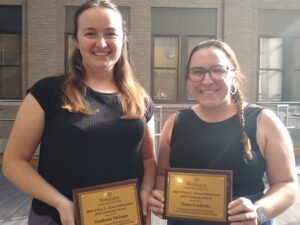Congrats to Tessa Lochetto and Madison Stringer: Elliot L. Elson Fellowship Recipients for Excellence in Biochemistry Education
September 2024
Congratulations to Tessa Lochetto and Madison Stringer on being awarded the Elliot L. Elson Education and Training Fellowship, which “supports educational opportunities for outstanding students and post-doctoral trainees” in the Department of Biochemistry and Molecular Physics. Both have been working to complete the requirements for the Teaching Citation as part of the CTL’s Professional Development in Teaching program.

We asked them to share their thoughts about teaching. Read on to hear more about their practices, preparation and plans.
What is a teaching strategy/practice you use with your students and why?
Tessa: For one of the classes I taught (Genes, Brains and Behavior with Dr. Yehuda Ben-Shahar), you could always expect the exams to be multiple choice or short answer. The short answer questions always came from the major topics that were lectured on. So, when my students wanted help on where to begin studying, I would have them brainstorm a list (that I wrote down on the board) of all the topics they think a short answer question could arise from. Then, I would have them brainstorm examples of questions that could be asked. More often than not, they identified almost all of the areas of interest for the exam. My 10-student discussion section always scored higher than the other discussion sections, and I think this teaching strategy of recall and critical thinking made the biggest difference.
Madison: I think one of the most important things to me in a classroom is to make sure people feel comfortable asking questions when they don’t fully understand a concept. Especially in some of the upper-level STEM courses I’ve been a TA for, concepts build on each other, and students need to have a good foundation to continue understanding concepts later in the course. However, sometimes students feel uncomfortable asking their questions. To help break down that barrier, I like to be honest with things that I don’t know, model what asking questions looks like, and always be positive and supportive in my answers to their questions. I’ve found that it really helps solidify everyone’s understanding of challenging concepts and open up communication with students that may need extra help.
How has learning about teaching at the CTL helped you to improve your skills?
Madison: The CTL has been really helpful in several aspects in my teaching. First and foremost, I have had the opportunity to learn about current practices in pedagogy and about their scientific basis through workshops. In addition, the CTL has been instrumental in helping me implement those new strategies for my courses specifically and helps me reflect on and improve the teaching I do in my lectures and discussion sections.
Tessa: Working with (and taking workshops with) the CTL has made me a more well-rounded educator. For example, the CTL has helped me become more inclusive in the classroom, give more constructive feedback, and grade more fairly/blindly.
If you could teach any course to any group of students, what would it be?
Tessa: If I could teach any course, it would be a general physiology course or a subset of lectures in a med school setting with focus on the cardiovascular and musculoskeletal systems.
Madison: I would love to be able to teach a Foundations in Biophysics to first-year graduate students sometime in my future. I think being able to help them build quantitative skills and breakdown any mental barriers that students may have related to math is super important for incoming graduate students.
Do you know of other graduate students and postdocs who have been recognized for their teaching? Share the details with us and we may be able to include them in a future newsletter.


